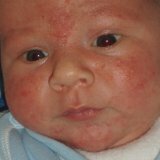Typhoid fever: symptoms, diagnosis and treatment
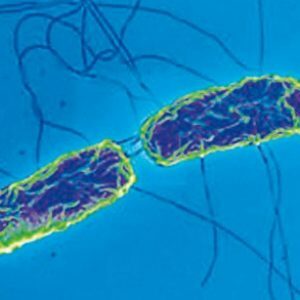
Typhoid fever is a disease of an infectious nature, the course of which is accompanied by severe intoxication of the body and pathological damage to the lymphatic system of the intestine.This disease is well known to mankind and in the recent past large epidemics of typhoid have been reported. With the development of the pharmacological industry and vaccination, the infectious disease in question has almost been defeated, but cases of infection with a pathogenic microorganism, which is the causative agent of typhoid fever, still occur. Table of contents: Transmission routes of typhoid How does typhoid fever occur Typhoid fever symptoms General principles of treating typhoid Typhoid prevention
Transmission routes of typhoid
 Typhoid fever is transmitted only by sick people - infection occurs after a patientIsolated in the environment pathogens, which can occur during excrement. Moreover, the pathogens safely settle in water and on household items.A very large role in the spread of the disease is played by flies, which carry dirt on their feet together with pathogens of typhoid fever.A healthy person can become infected with the disease in question after direct contact with a sick person( or carrier of pathogenic microorganisms) or when using infected food.
Typhoid fever is transmitted only by sick people - infection occurs after a patientIsolated in the environment pathogens, which can occur during excrement. Moreover, the pathogens safely settle in water and on household items.A very large role in the spread of the disease is played by flies, which carry dirt on their feet together with pathogens of typhoid fever.A healthy person can become infected with the disease in question after direct contact with a sick person( or carrier of pathogenic microorganisms) or when using infected food.
It is due to these features of the spread of the disease that the doctors made some conclusions about the characteristics of typhoid:
- Most often this disease is diagnosed in the warm season - summer and early autumn.
- Any organism perfectly perceives the causative agent of typhoid fever.
- Pathogenic microorganisms very quickly multiply and actively emerge from the sick person into the environment - rapid prevalence quickly leads to epidemics.
- The disease lasts a long time - an average of about 50 days, can also occur in a latent form.
- A person infected with typhoid fever may not be ill himself, but he is undoubtedly the carrier of the pathogen and poses a danger to others.
How does typhoid fever occur
An interesting feature of the disease under consideration: its pathogenesis is cyclical and all stages from penetration to the connection to the fight of the human immune system pass several times .This continues until the human immunity becomes strong enough that it can have a harmful effect on pathogenic microorganisms simultaneously in all places of their localization.
The proliferation of typhoid in the body occurs in stages:
- Pathogenic microorganisms penetrate the small intestine, or more precisely - into its terminal sections.
- Pathogens penetrate into the intestinal mucosa and cause a rapid progression of the inflammatory process - enteritis.
- Salmonella penetration( they are the causative agents of typhoid fever) in lymphoid tissue - lymph nodes and mesentery, and retroperitoneal space are affected.
- Pathogens penetrate into the bloodstream and enter the spleen and liver.Despite the active spread, pathogenic microorganisms continue to actively develop and multiply, penetrate deep into the tissues of organs.The result of such activity is the pathological processes of an inflammatory nature in the liver and spleen.
- As the pathogens of typhoid fever circulate in the bloodstream, the body "turns on" a protective reaction - the immune system that destroys salmonella and provokes the development of powerful intoxication begins to work.
Symptoms of typhoid
The incubation period of the disease in question lasts from 3 to 20 days.During this period the patient can note general weakness, increased fatigue, a slight increase in temperature, pain in the muscles of the lower extremities .These are all nonspecific symptoms, the digestive system is not yet pathologically affected during this period, so at this stage it is almost impossible to diagnose the disease in question.
But after the incubation period, all the symptoms of typhoid fever appear, which already serve as an excuse for the diagnosis:
- The patient's body temperature rises to the highest, critical values.This occurs periodically and is associated with a mass ejection of the pathogen into the body's bloodstream.
- There are all signs of a powerful intoxication of the body - severe weakness / dizziness, lowering of blood pressure / muscle pains, high sweat / chills on the background of high body temperature.
-
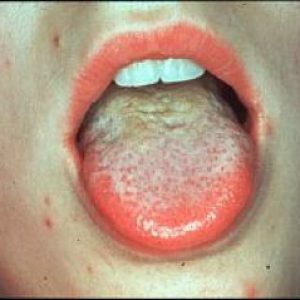 After 14 days from the onset of the disease, the patient's skin appears with characteristic eruptions, and the tongue becomes swollen and covered with a dark coating.
After 14 days from the onset of the disease, the patient's skin appears with characteristic eruptions, and the tongue becomes swollen and covered with a dark coating. - Intense pain in the right part of the abdomen, which is often perceived for an attack of acute appendicitis - the patient is taken to the hospital and already there doctors make an accurate diagnosis.
- Diarrhea.Such disorder of the intestine does not always appear, but if typhoid fever is severe and with complications, the patient will note diarrhea with blood.
- Increased liver( hepatomegaly) and spleen sizes, the latter becomes sharply painful on palpation.
Note: if the disease under consideration is severe, the patient will be diagnosed with jaundice, acute liver failure may develop.
As a rule, the symptomatology has a gradual / smooth rhythm of development, but there are cases when there is a rapid transition from one stage of the disease to another, which is accompanied by the stratification of all the symptoms.
General principles of treatment of typhoid
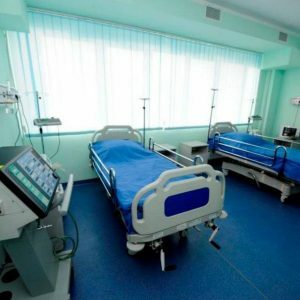 The disease under consideration is a danger to all mankind - epidemics, at times, it is very difficult to stop.Therefore, a person with such a diagnosis is immediately hospitalized in the infectious disease department of the hospital.It is very important to observe strict bed rest, which is prescribed for the entire period of fever and then for another 6-7 days, even if the patient's condition is more or less normal.And even after the specified period, patients with typhoid fever are only allowed to sit, get up and walk will be possible only 10 days after stabilization of body temperature.
The disease under consideration is a danger to all mankind - epidemics, at times, it is very difficult to stop.Therefore, a person with such a diagnosis is immediately hospitalized in the infectious disease department of the hospital.It is very important to observe strict bed rest, which is prescribed for the entire period of fever and then for another 6-7 days, even if the patient's condition is more or less normal.And even after the specified period, patients with typhoid fever are only allowed to sit, get up and walk will be possible only 10 days after stabilization of body temperature.
Necessarily the patient is prescribed a diet - it should be high in calories, but all food is easily assimilated.It is allowed for patients to consume semi-liquid food, steamed meat dishes, sour-milk products, liquid porridges.From drinks it is recommended to use not strong tea and natural juices.
Drug therapy consists in prescribing a course of antibacterial drugs, most often the choice of specialists falls on Ampicillin and Chloramphenicol .Mandatory antipyretic drugs are prescribed to alleviate the condition of the patient, and if necessary, drugs that can support the heart, the vascular system during this difficult period.It is advisable to prescribe vitamin complexes and sedatives.
Please note: patients are discharged from the hospital only after full recovery( this should be confirmed by laboratory tests) and not earlier than on day 23 after normalization / stabilization of body temperature.
Prevention of typhoid
The main prophylaxis of the disease under consideration is vaccination. For this procedure, two different types of vaccines are used:
- is a tablet form that contains weakened but live salmonellae of the typhoid type, which are the causative agents of typhoid fever;
- injection form, which contains inactivated salmonella.
One rule must always be observed: after vaccination, a person should not be in contact with sick people or carriers of a pathogen of typhoid fever.If such contact does occur, the course of the disease will be extremely difficult, accompanied by dangerous complications.
Doctors clearly specify the contraindications to the vaccination against typhoid :
-
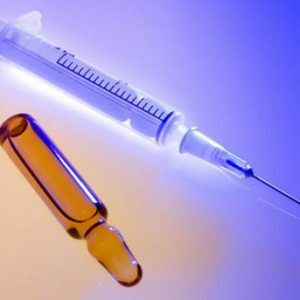 immunodeficiency diseases;
immunodeficiency diseases; - allergic reactions in the anamnesis;
- use of hormonal drugs of the corticosteroid group for medical reasons;
- previously diagnosed malignant tumors;
- conducted aggressive therapy with antibacterial drugs;
- periods of exacerbations of chronic diseases of a general nature.
Note: if all the above cases are contingent contraindications( the expediency of vaccination against typhoid is determined by a specialist), then the children's age is categorical.Moreover, it is strictly forbidden to give the vaccine in tablet form to children under 6 years old, and in the form of injections - up to 2 years.
After the introduction of the typhoid vaccine into the body of a healthy person, the following clinical manifestations may appear:
- nausea and vomiting;
- pain syndrome with abdominal localization;
- increased body temperature;
- headaches and muscle tissue;
- urticaria, laryngeal edema, and other allergy phenomena.
Note: , the appearance of the above symptoms does not pose a hazard to humans.This means only the start of immune processes in the body.The exception is an allergy, which should be reported immediately to a medical facility.
General preventive measures imply compliance with sanitary and hygienic standards and in the conduct of agriculture, and when taking water from natural sources, and when working at home. It is especially important to comply with these standards for food industry workers, since one consignment of infected products can trigger an outbreak of typhoid fever.
Forecasts for the disease in question are quite favorable.Of course, complications may arise - liver failure, necrosis of the intestinal tissues and subsequent rupture of the walls with the development of peritonitis, but this only occurs in the case of untimely treatment of the patient for qualified medical care.In most cases, all ends with a complete recovery.
Tsygankova Yana Alexandrovna, medical reviewer, therapist of the highest qualification category


